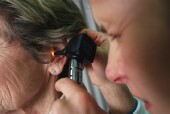
WEDNESDAY, Jan. 12 (HealthDay News) — Research in rats suggests that “rebooting” the brain can help stop tinnitus, a condition characterized by persistent ringing or other noises in the ears.
There is no cure for tinnitus, which can occur as a result of hearing loss.
In this study, U.S. researchers stimulated the vagus nerve while simultaneously playing a variety of sound tones over an extended period of time. The goal was to increase the numbers of neurons tuned to frequencies other than the tinnitus frequency.
The vagus nerve is a large nerve that runs from the head and neck to the abdomen. When stimulated, the nerve releases chemicals that help encourage changes in the brain. Vagus nerve stimulation is sometimes used to treat depression and epilepsy.
A control group of rats received vagus nerve stimulation with no tones, no therapy or tones with no vagus nerve stimulation.
Judging from the resulting neuron activity, the rats receiving vagus nerve stimulation while listening to different tones appeared to be cured of tinnitis. Promising research with animals often fails to produce similar results in humans, however.
“Current treatments for tinnitus generally involve masking the sound or learning to ignore it. If we can find a way to turn off the noise, we’ll be able to improve life substantially for the nearly 23 million American adults who suffer from this disorder,” Dr. James F. Battey, Jr., director of the U.S. National Institute on Deafness and Other Communication Disorders, said in a National Institutes of Health news release.
The NIDCD funded a large part of the study, published online Jan 12 in the journal Nature. MicroTransponder Inc., whose scientists worked on the project along with those from the University of Texas at Dallas, also helped sponsor the research.
In people with tinnitus, it’s believed that “the part of the brain that processes sounds — the auditory cortex — delegates too many neurons to some frequencies, and things begin to go awry. Because there are too many neurons processing the same frequencies, they are firing much stronger than they should be,” study co-principal investigator Michael Kilgard, an associate professor of behavior and brain sciences at the University of Texas at Dallas, said in the news release.
“The key is that, unlike previous treatments, we’re not masking the tinnitus, we’re not hiding the tinnitus,” he said. “We are returning the brain from a state where it generates tinnitus to a state that does not generate tinnitus. We are eliminating the source of the tinnitus.”
The researchers plan to try the treatment on tinnitus patients in Europe.
More information
The American Tinnitus Association has more about tinnitus.

